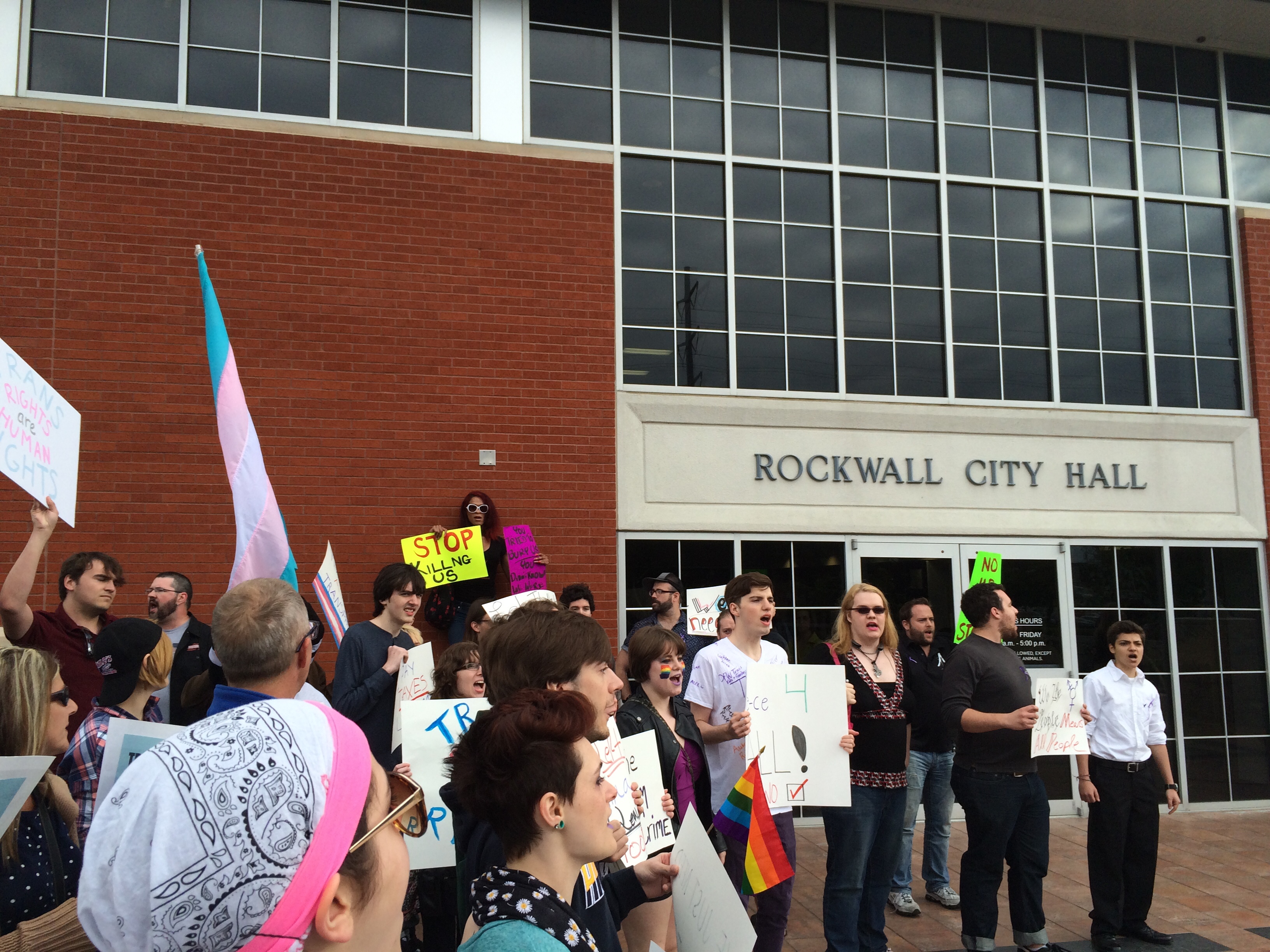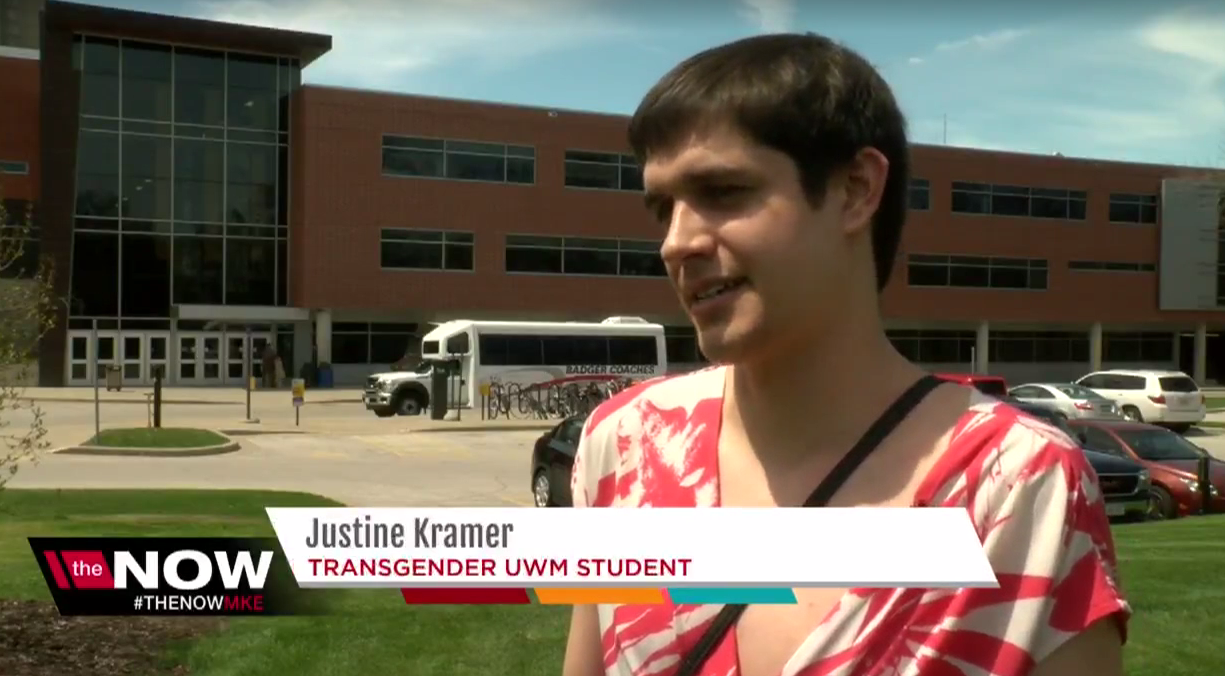Bathroom Ordinance Proposed in Texas City, Thankfully Dies Without a Vote
By Audrey White
A proposed bathroom ordinance similar to North Carolina’s failed to gain traction in Rockwall, Texas and died without a vote at City Hall on Monday night.

More than 100 trans people and allies from around North Texas gathered in front of City Hall before the city council meeting to rally support for trans rights, and many stayed to observe the meeting. The majority of Rockwall citizens who spoke during the meeting’s open forum opposed the ordinance, including business owners, church leaders and parents of trans youth.
One speaker called the ordinance “discriminatory, unnecessary, and opportunistic” and said “I would not have voted for you if I knew you were going to propose this.”

Rockwall District Attorney Kenda Culpepper spoke as a resource witness for the ordinance, but could not identify a single instance of a trans person posing a threat in a bathroom in Rockwall county — instead she mentioned two cases of cis men, not trans women, sexually violating boys, including one case in a men’s bathroom and one in a Target parking lot.
Culpepper is the wife of Mayor Jim Pruitt, who proposed the ordinance as a direct response to Target’s policy that trans people may use the restroom that aligns with their gender identity. He did not gain the support of any of the other council members, and the ordinance did not go to a vote.
The Dallas suburb has a population of nearly 40,000. It would have been the first Texas city to pass a bathroom law. The East Texas town of Lufkin is considering a similar ordinance. Texas’s legislative session meets biannually and so this issue won’t gain a statewide platform until 2017, if it does at all. If Rockwall’s citizens are any indication, Texans don’t want transphobic bathroom laws that take away citizens’ rights, will hurt business, and that would be costly, difficult and embarrassing to enforce.
Organizations like Dallas-based Trans Pride Initiative will continue to organize around the issue and encourage individuals to speak out.
“We want people to feel empowered to mobilize wherever they are,” said Trans Pride Initiative President Nell Gaither. “We’re trying to keep it going after this on social media so more people know what’s happening and get involved.”
More on Bathroom Bills Around the Country
+ Two anti-trans bathroom bills in Kansas that would’ve barred trans students at public schools and universities from using facilities that correspond to their gender and would’ve provided a reward to those who report violations of the proposed law are now dead. The Advocate reports:
“While Senate Bill 513 was killed a month ago, the identical House Bill 2737 could have potentially been brought up at any time and passed as an emergency measure,” LGBT rights group Equality Kansas reports on its website. But after several late nights working on the state budget and other matters, the legislature finished its session at 3:30 a.m. today without taking up either bill. The work of activists across the state helped keep the bills from becoming law, according to Equality Kansas.
+ In an interview for Buzzfeed, U.S. Attorney General Loretta Lynch spoke out against transgender discrimination:
“To me, this is really an issue of equality and fundamental fairness and what kind of a society do we want to be,” she said, unprompted. “We decided over 200 years ago that we wanted to be an inclusive society, and we wanted to guarantee equal rights for all. For that to mean something, we have to be careful, we have to be vigilant, so that when people, for whatever reason, are either [made to] feel like they’re on the outside — a particular group — or are placed on the outside, that that doesn’t happen. And transgender issues are no different, to me, in that regard.”
+ A new ad paid for by American Unity Fund, Freedom for All Americans, and Equality North Carolina features a trans man and his colleagues talking about the unfair targeting of HB2. The organizations hope to show images and real life stories of people affected by the new bill.
+ The American Family Association, a designated hate group according to the Southern Poverty Law Center, has been “testing” Target’s bathroom policy, which allows customers and employees to use the bathroom that corresponds to their gender, by sending cis men to the women’s restroom. The group believes this is about giving sexual predators an invitation to prey on women and girls, but that’s far from the truth — and apparently they’re willing to create the exact situation they claim to want to prevent to try to prove it.
Anti-LGBT Discrimination and Hate
+ A utility company in New York fired a woman for posting lesbian art on her Instagram account. Samantha Chirichella was hired at ConEd, and then the company rescinded their offer because they found “sexually explicit material” on her Instagram account, which Chirichella says was a friend’s fine art. Chirichella is suing the company for discrimination because she believes the company fired her for her comments on the photo. The New York Post reports:
In the exchange, a poster named Danielle comments to Chirichella, “It’d be hotter if it was us,” and Chirichella replies, “hahah I agree:)”
[Chirichella’s lawyer, Arthur] Schwartz said ConEd was actually offended by the discussion about Chirichella’s sexual orientation, not the image, and discriminated against her based on the fact that she may be a lesbian.
+ Another gay man was brutally attacked in Dallas’ gayborhood Oak Lawn, making him the 17th reported attack in the area, plus a dozen more that have been in the media but gone unreported to the police. Craig Knapp was walking his friend’s dog late at night when two men approached him and asked Knapp what the dog’s name was. Knapp told the men the dog’s name was “Sissy” and that’s when one of the men laughed and then slammed him to the ground, pushing his face onto the pavement, kicking him and calling him a homophobic slur. Since the influx of these brutal attacks on mostly gay men in the area, the police haven’t made an arrest. The community has been outraged by the attacks and have called for more security in the area. The city has responded by adding more security cameras and additional police officers in the area. Survivors of the attacks have also started a support group.

+ Justine Kramer, a transgender University of Wisconsin-Milwaukee student, says she’s being discriminated at the university for using the women’s locker room at the school’s fitness center. Kramer filed a complaint against the Klotsche Center for kicking her out when she thought their policy was inclusive. Timothy Gordon, Dean of Students, says they’re working on a new policy to “attempt to provide access to facilities to people based on their gender identity, but also balance the rights of all students who use those facilities.” There’s currently a petition to create a more inclusive policy on campus.
+ On Friday, Laneia wrote about the viral video of a lesbian being forced out of a bathroom by police who didn’t think she “looked like a woman.” Well now, there’s another video that shows a man asking a woman with short hair and basketball shorts outside a women’s restroom at Baylor Medical Center if she’s a woman. These discriminatory bathroom bills are aimed at and primarily affect trans women, but these videos show how these bills also hurt other women in the community.
Law & Order
+ Victory Fund and Institute, an organization that helps get LGBT people elected into office, found unsurprising stats on the correlation between out LGBT politicians in states with discriminatory anti-LGBT laws. They found:
- Nearly 80% of the states facing religious refusal bills have either one or zero openly LGBT state legislators.
- In states that are facing anti-LGBT legislation, nearly 75% have only one or zero openly LGBT state legislators.
+ Activists and prosecutors are calling for the Oklahoma legislature to look into the state’s sexual assault laws after an appeals court rejected to prosecute a 17-year-old boy who is accused of sexually assaulted an unconscious 16-year-old girl.
+ A couple of weeks ago, Virginia Democratic Governor Terry McAuliffe signed an executive order that would restore the voting rights of people convicted of felonies. Virginia Republicans aren’t happy about the decision saying McAuliffe “overstepped his constitutional authority” and is a ploy to gain votes for his friend, Hillary Clinton. The no-felon voter laws are deeply racist and goes back to a little after the Civil War which have deeply affected black people. Republican lawmakers plan to file a lawsuit against the governor.
+ A woman is suing the Church of Scientology, claiming the organization forced her to have an abortion at 17, among other allegations. She originally filed the lawsuit in 2009, but Scientology lawyers managed to delay it from going to trial until now. Laura DeCrescenzo was recruited into the church at age of 6 with her family and at age 12 worked at the Sea Org, which is the church’s highly secretive member-employee group.
Grab Bag
+ The FDA launched a $35.7 million dollar anti-tobacco campaign aimed at LGBT young adults called “This Free Life.” The campaign aims to prevent and reduce smoking among LGBT 18-24 year olds, who are twice as likely to use tobacco than their straight counterparts. Here’s one of their ads:
https://www.youtube.com/watch?v=DWGMlWoSFNY
+ Democratic congresswoman Katharine Clark filed a bill that would require the U.S. Department of Education to make public which colleges and universities have cited their religious principles as an exemption from following certain Title IX rules which protect students against sex discrimination. The Huffington Post reports the exemption allows schools to “turn away LGBT students in matters of admissions, financial aid, housing, sports teams, clubs and even campus counseling.” Currently, the Department of Education posts which schools were given exemptions but that could change with a new administration in 2017. Clark filed the bill in order to keep this information public long after Obama’s term so students can make an informed decision.
+ A new study finds women feel their sexiest at age 34. More than 60% of the women surveyed say they feel sexier because they feel more confident as they age and 34% say they attribute their feelings to being in better relationships.







